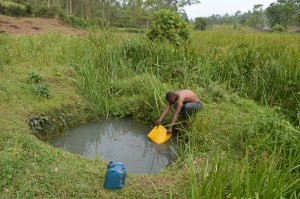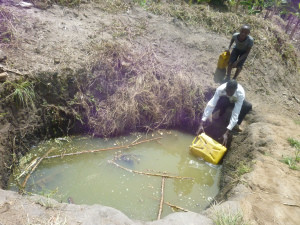Every time Chrispus Twikirize, a student and resident of Kainamo in Ibaare, Igara Bushenyi, goes to the well to fetch water for domestic use, he has no choice – he draws the same dirty water completely contaminated with solid wastes, algal blooms and toads.

“We have no choice. This is our only source of water. The quality is gradually becoming worse,” narrates Chrispus, a student of Ankole Western University in Sheema district.
Jeconeous Musingwire, an environment scientist with the national environment watchdog – NEMA, says it is possible that the water that Crispus fetches from their well is full of mud, faecal matter; fertilizers and soil sediments.
The UN Water notes that deteriorating water quality has become a global issue of concern as human populations grow, industrial and agricultural activities expand, and climate change threatens to cause major alterations to the hydrological cycle.
What is more worrying is that surface water sources such as wells, lakes, rivers, streams and ponds which are vital sources of water for public supply in developing countries, are the ones that get contaminated easily.
In the rural and urban communities of South-western Uganda, surface water accounts for about 99% of the total public water supply in the region, according to Jeconeous.

“Up to three-quarters of water surface in the region is contaminated. Surface water is not clean for consumption,” insists Jeconeous.
“When showers come, the first run off is full of all sorts of dirt including human wastes due to open defecation. Animals also drink directly from these water points. And some latrines are shallow. Faecal matter from these latrines end up going into water sources,” narrates Jeconeous.
Water pollution is the major cause of several diseases – including typhoid, dysentery, hepatitis A, cholera and diarrhoea in developing countries.
According to the World Health Organisation, up to 3.2 million children under the age of five in developing nations die annually as a result of unsafe drinking water and poor sanitation.
Water scientists insist that such deaths are bound to keep soaring unless people stop interfering with the water cycle such as through deforestation, destroying vegetation, encroaching on wetlands.
Charles Ngabirano, a water engineer, says the water filtration capacity has been compromised.
“People have destroyed the vegetation cover, wetlands and trees which used to filter such water. What do you expect? All that running water collects on the way is now deposited into wells.”
Vegetation cover – wetlands in particular – act as nature’s kidneys. They filtrate water by removing sediments, pollutants, excess nutrients as well as retaining water which averts flooding.
Charles insists that all surface water must be treated before consumption, vegetation cover conserved and catchment areas preserved.
Additionally, Fredrick Muhanguzi, an agricultural value chain expert says farmers must desist from toxic agriculture practices.
Farmers should not cultivate on banks of water sources such as rivers. They need to practice proper farming methods that do not cause soils from hilly areas to slope down the hills and pollute water sources in valleys every time it rains.”
By Fredrick Mugira (Water Journalists – Africa/WaterSan Perspective)
This story was produced with support from the CSE Media Fellowships Programme for the Global South.
